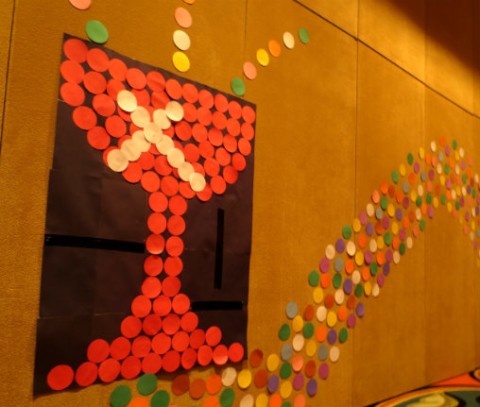Talking points: Disciples vote on pro-gay resolution
In July, the general assembly of the Christian Church (Disciples of Christ) approved a resolution calling on the church in all its expressions to affirm the faith, baptism and spiritual gifts of everyone regardless of sexual orientation or gender identity. This vote was timely given the Supreme Court’s recent decision on the Defense of Marriage Act, though the resolution doesn’t specifically mention same-sex marriage. Nor does it mention ordination—the other hot-button issue around sexuality in the church—though it does affirm that neither sexual orientation nor gender identity is “grounds for exclusion from fellowship or service within the church.”
This was a “sense-of-the-assembly” resolution, representing a majority of those gathered. Such resolutions are nonbinding on regions and local congregations—no policies were changed—and simply constitute a recommendation to the church. Each congregation is free to reject, adopt or ignore this as it sees fit.
Read our latest issue or browse back issues.
I sometimes envy my ecumenical colleagues whose denominations have already fought this issue out, voted and moved on. They may have lost members and divided their ranks, but at least now they know where they stand. They ordain gay and lesbian people; they preside at gay weddings. Their denomination said it was okay.
We Disciples don’t work that way. We have always been resistant to hierarchy, born as we were on the American frontier a generation after independence. We don’t make top-down declarations; we wrestle things out in congregations with the very people we meet at the communion table each week.
And we are not of one mind on this (or any) question. In my own congregation, reactions to this resolution range from “It’s about time” to “Well, we’ll probably lose some more churches now.” As Disciples, we have declared ourselves to be a “people of grace and welcome to all”—but some will find themselves left out by this.
One pastor told me he would feel better about the resolution if it stated clearly that the people who disagree are welcome, too. It’s a good point. Does passing a resolution like this actually marginalize those who are against it? What about the woman who has given her life to the church, as faithful as can be, but just can’t get her head around the possibility of two men loving each other? Will she feel welcome now that this resolution has passed?
So I understand the urge to back away from declarative statements. Votes divide us. Congregations and denominations that have put this question to a vote have almost invariably lost people in the process. If we’re going to say we welcome all people, then we had better be sure we actually do—as our president Sharon Watkins said in her sermon to the assembly Sunday night, “whether you’re LGBTIQ or not even sure what that means.”
But I also think we need to be particularly intentional about stating our welcome for those who have been most often left out or discriminated against. After all, that seems to be the way Jesus operated most of the time.
One Facebook friend—part of a same-sex couple—posted this just before the business session: “Feeling vulnerable this afternoon. We’re talking about real, beloved children of God.” Gay and lesbian Christians have been excluded and alienated by the church for too long, often causing real and lasting pain. Maybe an explicit welcome is the least we can do.
I think of the teenager who stood up during the discussion of the resolution and said that most of his friends don’t know any Christians who support LGBT folks. I think of the woman who doesn’t mention her new girlfriend because she doesn’t know what her church friends will say. I think of the families who could be loved by the church if only they knew they would be welcomed.
I’m all for individual expression of faith. I’m not going to tell my Disciples friends what to believe. I want to have tough conversations with the people who sit next to me in the pews, even though that’s much harder work than following a hierarchical decree. We’re bound by our faith and our baptism, and we meet at the table even when we disagree.
But sometimes the church is called to be a voice of justice. Our general assembly shared a convention center with the NAACP, and the mere presence of that group—especially following the Voting Rights Act decision and the George Zimmerman verdict—was a reminder that injustice is overcome only when people raise their voices together.
So: to take a vote and take a stand? Or keep talking about it?
That afternoon, as the business session inched past other reports and on toward the resolution, it began to rain. Even in the windowless assembly hall, we could hear the rumbling of the afternoon Florida thunderstorm. One particularly loud thunderclap sounded just as the moderator spoke, leading me to wonder if God enjoys a good cliché. I suspect I was not the only one to wonder whether the storm brewing in the room would be as ferocious as the one outside.
The agenda item right before the resolution was listed as a “covenantal conversation.” We were asked to find a few people near us who we didn’t know and to answer a couple of scripted questions. It was part icebreaker, part opportunity to get up and stretch, but mostly a reminder that we are in covenant with one another—that the people sitting next to us are real people, with gifts and opinions of their own.
I chatted with the couple next to me and a young woman behind me; we answered the questions dutifully and played the game we Disciples play in which we find the six (or more likely, two) degrees of separation between us. (In this case, one of my conversation partners knew my parents.) Then I escaped to the bathroom for the rest of the break.
It was still thundering when the moderator opened the floor for discussion on the resolution. The debate went as you might expect. Those in support told stories of being left out and unwelcome and spoke of new possibilities for the church. One speaker in opposition said we didn’t need this resolution to tell us to welcome all people; we should be doing that anyway. Another said that the Bible says homosexuality is wrong.
The most heartbreaking story came from a man arguing against the resolution. He said he’d been molested as a child and had been attracted to men, but then he accepted Jesus in his life and married a woman. “I am proof,” he said, “that people can change.” Despite his jarring and erroneous connection between molestation and homosexuality, his testimony highlighted just how complex these questions are—and how dearly we need more grace and welcome.
Near the end of the discussion time, the whole process got hung up on a procedural issue. Twenty-four minutes had been allotted for discussion, twice as much time as usual. The lines at each microphone were long; it was clear that not everyone would be able to speak. As time wound down, a delegate called for a vote to extend the discussion time for another 24 minutes.
I rolled my eyes. I was feeling cranky, anxious to get out of the overly air-conditioned hall and go see my kids. Really? I thought. The church has been talking about this since before I was born. Let’s get on with it and make a decision.
So I voted against continuing the conversation. At first it was a voice vote, but it was too close to call—so the moderator asked us to stand. As I stood with the others voting no, I realized that my new friends—the ones with whom I’d had the covenantal conversation—had all voted yes. I glanced over at them sheepishly. Turns out it’s awfully hard to vote against people you know, people with whom you share a covenant. “I just . . . I just don’t know what good it would do to keep talking,” I mumbled. Even as I said it out loud, I knew I was wrong.
The procedural vote fell short of the necessary two-thirds majority, so the discussion ended. Talking for 24 more minutes probably wouldn’t have made much difference in the outcome; I doubt there were many there who hadn’t come already knowing how they would vote. But it would have let us hear a few more stories. And stories—not votes—are how we share our lives. Stories are the way minds are changed.
When it finally came time to vote on the resolution itself, my covenantal conversation partners and I all voted yes. So did the vast majority of people in the assembly hall. But it wasn’t unanimous, so there are more conversations, more stories, ahead. That’s as it should be. We needed to take a stand. Now we need to sit back down and keep talking.






